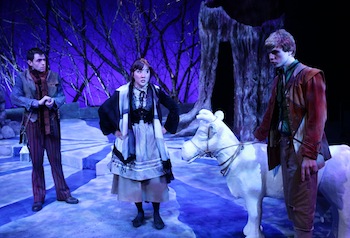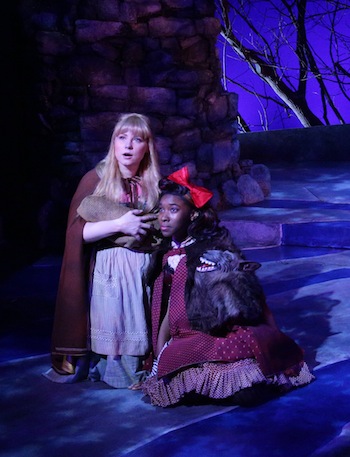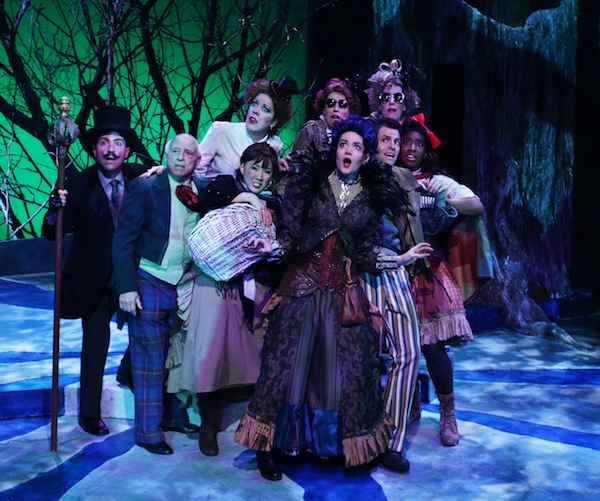Theatre Review: These “Woods” Are Lovely, Dark, and Deep
The Lyric Stage Company’s thoroughly enjoyable production more than does “Into the Woods,” Stephen Sondheim’s un-Disneyfied version of fairy tales, justice.
Into the Woods. Music and lyrics by Stephen Sondheim. Book by James Lapine. Directed and staged by Spiro Veloudos. Music director Catherine Stornetta. Produced by the Lyric Stage Company of Boston, 140 Clarendon Street, 2nd floor, Boston. Run extended through June 29.
By Evelyn Rosenthal
For those of you who like your fairy tales un-Disneyfied, Stephen Sondheim and James Lapine’s Into the Woods is your kind of musical. The 1988 Tony winner combines four classic tales and serves them up with all the Grimm trimmings—curses cast and reversed, pecked-out eyes, sliced toes and heels, and a couple of trips into the actual belly of a beast. One of Sondheim’s most popular works, the show twists the familiar stories of Jack and the Beanstalk, Cinderella, Rapunzel, and Little Red Riding Hood into a darker, deeper tale of parents and children, lovers and dreamers, fate and family, and the consequences of getting what you wish for. It’s a beautifully realized work with memorable music, some of Sondheim’s wittiest lyrics, and a book that’s both funny and touching, and the Lyric Stage Company’s thoroughly enjoyable production more than does it justice.
This story about stories begins with an avuncular narrator (Will McGarrahan) introducing each set of characters, ending with a baker and his wife who discover that their infertility was caused by the curse of the witch next door. The witch—a ragged, hunched hag with the strong, clear voice of Aimee Doherty—had caught the baker’s father stealing greens for his pregnant wife from her garden: in Sondheim’s giddy alliteration, “Rooting through my rutabaga, / Raiding my arugula and / Ripping up the rampion / (My champion! My favorite!).” In exchange for not turning him into “a dog, or a chair,” the witch had taken the baby, Rapunzel, and, for added measure, cursed the baker’s family tree with barrenness. To break the spell, the baker agrees to a quest for four objects that will take him and his wife into the woods, where their paths—and destinies—meet up with those of the fairy-tale characters.

John Ambrosino (the Baker), Lisa Yuen (the Baker’s Wife), and Gregory Balla (Jack) in Lyric Stage Company’s “Into the Woods.” Photo: Mark S. Howard.
First up is a “cow as white as milk”—Jack’s “best friend,” Milky-White, which his mother (Beth Gotha) has sent him to market to sell. The Baker’s Wife (Lisa Yuen) takes the lead in duping Jack out of the cow for the price of five beans, telling him they’re magic. Yuen gives a first-rate performance as the clever woman who knows what she wants and is willing to tell “tiny lies” to get it. The Baker, splendidly played and sung by John Ambrosino, has misgivings, especially when he has to steal the “cape as red as blood” from the little girl, Red Ridinghood. The two younger characters are perfectly cast: Gregory Balla, as Jack, has a marvelous voice and conveys just the right mix of bravado, befuddlement, and tenderness, while Maritza Bostic lights up the stage whenever she skips into range as the fearless, always hungry Red Ridinghood (sometimes, hilariously, singing with her mouth full).
Other standouts in the excellent 17-member cast include the two princes, Cinderella’s (Maurice Emmanuel Parent, who also menaces convincingly as the Wolf) and Rapunzel’s (Sam Simahk), especially in the wry duet “Agony,” in which they compare notes on their suffering in pursuit of their would-be princesses. Erica Spyres (who just won the 2014 Elliot Norton Award for Outstanding Actress for her work in SpeakEasy Stage’s production of Tribes) is a winsome Cinderella with a lovely soprano voice, as convincing in her longing to escape her wretched household as she later is in rejecting the prince and the trappings of royalty. Oh wait—did I forget to mention that this fairy tale doesn’t exactly end at “happily after”?

Erica Spyres (Cinderella) comforts Little Red Ridinghood (Maritza Bostic) in “Into the Woods.” Photo: Mark S. Howard.
In the second act, what was a lively romp becomes something completely different, and darker. A Giantess, whose husband fell to his death when Jack cut down the beanstalk after fleeing with the Giant’s gold, terrorizes the kingdom, flattening cottages, palace, and people like a vengeful Godzilla. Voiced offstage and only visible through a shadow projection, the looming Giantess blows an ill wind into the proceedings. When the witch, trying to shake the others out of their dazed grief, proclaims, “Wake up! People are dying all around you,” I found myself thinking about the AIDS epidemic that was casting its deadly pall on so much of the theater world in the 1980s. In a 2012 article in The Sondheim Review, Sondheim denied that the Giantess represents AIDS because she “is not a natural phenomenon, but a force roused to vengeance by greed, prevarication, and irresponsibility.” Whatever this scourge may symbolize, the recognition that nobody lives “happily ever after”—at least not forever—gives the darker half of the show its punch. The existential threat brings the characters together into a community of loss and blame and guilt, but, working together, the community (if not all its members) survives.
Sondheim’s score, which the seven accomplished musicians (including music director Catherine Stornetta) play to perfection, saves some of its most gorgeous songs for the end. Doherty, as the witch who gets her wish for youth and beauty but suffers great losses, gives a powerful reading of the character’s farewell, “Last Midnight”; “No One Is Alone,” with the Baker and Cinderella comforting young Jack and Red Ridinghood, is moving and beautifully sung; and the highlight of the finale, the tender “Children Will Listen,” reminds us to be careful of the wishes we make and the tales we tell because there will inevitably be consequences. Well, every fairy tale has some kind of moral. And the moral of this tale—and this production—goes down very easily in a spell woven of brilliant words and music.
Evelyn Rosenthal is the former editor in chief and head of publications at the Harvard Art Museums. She is also a professional singer, specializing in jazz and Brazilian music, and has taught English and composition at Massachusetts community colleges. She writes about musical theater, books, and music for the Arts Fuse.
Tagged: Into the Woods, James Lapine, Lyric stage company of boston, Spiro Veloudos


